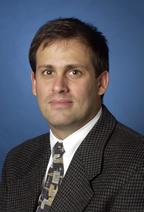The HCFO program ended in December 2016.
This site will no longer be updated, and some elements may not appear correctly.
Michael Chernew, Ph.D.

Michael Chernew, Ph.D., is a professor at the University of Michigan in the Departments of Health Management and Policy, Internal Medicine, and Economics, where his research focuses on assessing the impact of managed care on the health care marketplace. In particular, he examines the impact of managed care on health care cost growth and on the use of medical technology. His work has also focused on examining the determinants of health plan choice, with an emphasis on the role of quality in influencing plan choice.
Chernew’s HCFO project examined how managed care in the traditional fee-for-service Medicare environment can affect health care utilization and delivery. In order to inform the debate over Medicare managed care in the climate of the Medicare Modernization Act, Chernew and colleagues Phil DeCicca, at the University of Michigan, and Robert Town, Ph.D., at the University of Minnesota, explored how Medicare+Choice (M+C) payment rates affect M+C and fee-for-service (FFS) utilization and expenditures. There are two plausible ways that Medicare managed care enrollment can affect FFS Medicare spending that this study addressed. Spillover effects (changes in the care delivered to FFS enrollees because of M+C) may arise when physicians practice similarly for both M+C and FFS patients. Alternatively, selection effects (the impact of non-random selection of beneficiaries into M+C) can occur when healthier Medicare beneficiaries enroll in M+C and the FFS population remains sicker. Chernew et al.’s, examination of the influence of M+C helped to distinguish between selection effects and spillover effects.
Chernew’s non-HCFO research has addressed how insurance products can be redesigned to generate more value per dollar spent. In addition, in 2000 and 2004, he served on a technical advisory panel for the Health Care Financing Administration (now the Centers for Medicare and Medicaid Services) that reviewed the assumptions used by the Medicare actuaries to assess the financial status of the Medicare trust funds. On the panel Chernew examined the methodology used to project trends in long-term health care cost growth.
Chernew is co-editor of the American Journal of Managed Care and co-director of The Robert Wood Johnson Foundation’s Scholars in Health Policy Research program at the University of Michigan. He also serves on the Commonwealth Foundation’s Commission on a High Performance Health Care System.
In 1998, Chernew was awarded the John D. Thompson Prize for Young Investigators by the Association of University Programs in Public Health. In 1999, he received the Alice S. Hersh Young Investigator Award from the Association of Health Services Research. Both of these awards recognize overall contribution to the field of health services research. He received a Ph.D. in economics from Stanford University, where his training focused on areas of applied microeconomics and econometrics.
Selected Publications:
Chernew, M.E. et al. “Disability and Health Care Expenditures Among Medicare Beneficiaries,” Accepted for Publication in Health Affairs, 2005.
Chernew, M.E. et al. “Charity Care, Risk Pooling, and the Decline in Private Health Insurance,” Forthcoming, AER Papers and Proceedings, 2005.
Chernew, M.E. et al. “Quality and Employers’ Choice of Health Plans,” Journal of Health Economics, Vol. 23, No. 3, May 2004, pp. 471 - 492.
Chernew, M.E. et al. “Barriers to Constraining Health Care Cost Growth,” Health Affairs, Vol. 23, No. 6, November/December 2004, pp. 122 - 128.
Chernew, M.E. et al. “Increasing Health Insurance Costs and the Decline in Insurance Coverage,” Health Services Research, Vol. 40, No. 4, August 2005, pp. 1021 - 1039.
Chernew, M.E. et al. "Overlap in HMO Physician Networks,” Health Affairs, Vol. 23, No. 2, March/April 2004, pp. 91 - 101.
Chernew, M.E. et al. “Increased Spending on Health Care: How Much Can the United States Afford?” Health Affairs, Vol. 22, No. 4, July/August 2003, pp. 15 - 25.
